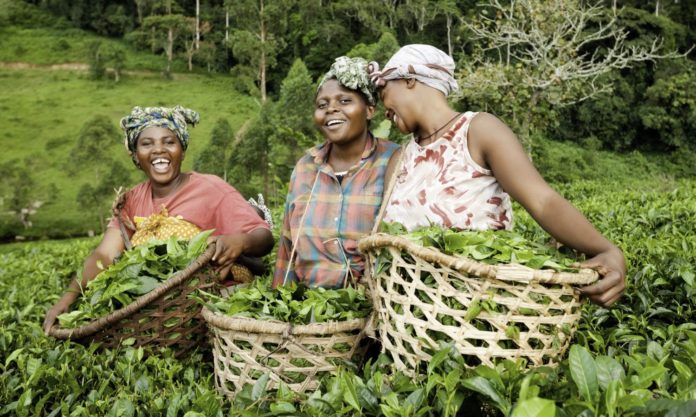Agriculture remains one of the most productive sectors across Africa, employing 70% of the continent’s population and contributing about 23% to GDP. Women make up a sizable portion of this workforce but face structural constraints that hinder their development within this critical sector of the African economy.
The United Nations states that if women in rural areas had the same access to land, technology, financial services, education and markets as men, agricultural production could be increased and the number of hungry people reduced by 100-150 million.
With the impact of the COVID-19 pandemic exacerbating extreme poverty on the continent and extreme weather events resulting in a loss of agricultural productivity, it is critical to explore ways of improving work opportunities for women in agriculture. One such way is to enable access to relevant solutions that support their development within the sector and lessen disruption to their livelihoods.
“To limit the impact of climate change on farming operations and help farmers stay afloat, it is crucial that farmers leverage smart farming technologies. Digital farming methods can empower farmers to farm more efficiently and make more informed decisions. For example, insightful data on crop health and weather patterns can help enhance their yield,” explains Nico Groenewald, Head of Agriculture at Standard Bank.
Technology has completely transformed agriculture over the last few decades. These days, farmers are integrating everything from drones and satellite sensing to genetic modification and, more recently, artificial intelligence (AI) into their operations to reduce costs and improve production.
“Smart farms and modern technology will empower more women to run farms and take on leadership positions in this industry. However, African women, especially those working in rural areas and on smallholder farms, have limited access to reliable banking services. This requires interventions to ensure equitable access to the funding, expertise, and skills needed to grow their businesses,” adds Groenewald.
To remedy this, Standard Bank has partnered with various organisations to implement several agriculture initiatives that focus on women and democratising access to data, finance, skills, and mentorship. These efforts are helping to close the gender gap in agriculture.
Although much more needs to be done to minimise this divide, positive progress is being made on the continent, and there are increasingly more examples of women in Africa who are starting to fill the gap in agriculture. Their resilience and determination to succeed in a gendered sector serves as an inspiration to other female farmers who wish to do the same.
Over the years, Standard Bank has played a key role in uplifting women in agriculture through various initiatives, including the UN Women Climate Smart Agriculture (CSA) programme. The collaboration equips female farmers in Nigeria, Uganda, Malawi, and South Africa with the necessary skills and resources for business growth and success. In addition to providing support through financial literacy, the bank provided US$3 million in funding to the programme. The project is closely aligned with Standard Bank’s purpose statement: ‘Africa is our home, we drive her growth’.
In South Africa specifically, the bank also sponsors African Farming – a local TV show that celebrates agriculture excellence by spotlighting successful black and female farmers to inspire up-and-comers in the industry.
For example, award-winning farmer and entrepreneur Mbali Nwoko, CEO of Green Terrace Farm, where she produces high-value vegetable crops for leading retailers and markets in South Africa. Nwoko applies her previously acquired business skills to her hydroponic farm, and by leveraging innovation and maximising land space, she has been able to establish more efficient farming methods. She shares her expert insights in podcasts and articles to empower aspiring farmers to better navigate the journey to agriculture success. Now, Nwoko has set her sights on targeting the export and franchise markets.
Similarly, internationally recognised farmer and mentor Pinky Hlabedi has a passion for mentoring young females and passing on her valuable skills. She has faced numerous challenges, including stock theft and having an entire herd of cows test positive for brucellosis after acquiring her farm. Despite these difficulties, she continued to pursue her dream. “I have overcome my challenges by focusing on my objectives. With the volatility that is prevalent in agriculture, it is important to have agricultural insurance and plan your cash flows sufficiently so that you can stay afloat when challenges arise,” explains Hlabedi.
Emphasising the importance of having insurance for your business, the World Bank’s Groundswell report, released in September 2021, projects that Africa will be hit the hardest by climate change. Increasing temperatures and sea levels, extreme weather, and drought all pose a significant risk to our agricultural sector. As such, sustainable farming methods have never been more imperative.
Dineo Mokgoshi, the winner of the Department of Agriculture’s Best Farmer Award in 2014, experienced operational disruptions caused by extreme weather first-hand. After leaving her successful business to pursue her passion for farming, severe hailstorms killed her chickens and livestock. She remained tenacious and invested in chicken houses to protect her business from the possibility of a similar event happening in the future.
In light of this, it’s crucial to understand the risks that a farming business could be exposed to and have a risk mitigation strategy in place. More so, the relationship between a farmer and their bank cannot be overemphasised. The banker must understand the farmer’s plans for the business, whether to expand or diversify markets, and the risk mitigation products needed.
“Standard Bank has a team of agricultural experts who visit each client to understand their unique operations and can advise accordingly. From working capital to crop insurance, we provide a full range of specialised banking solutions for farmers,” concludes Groenewald.








